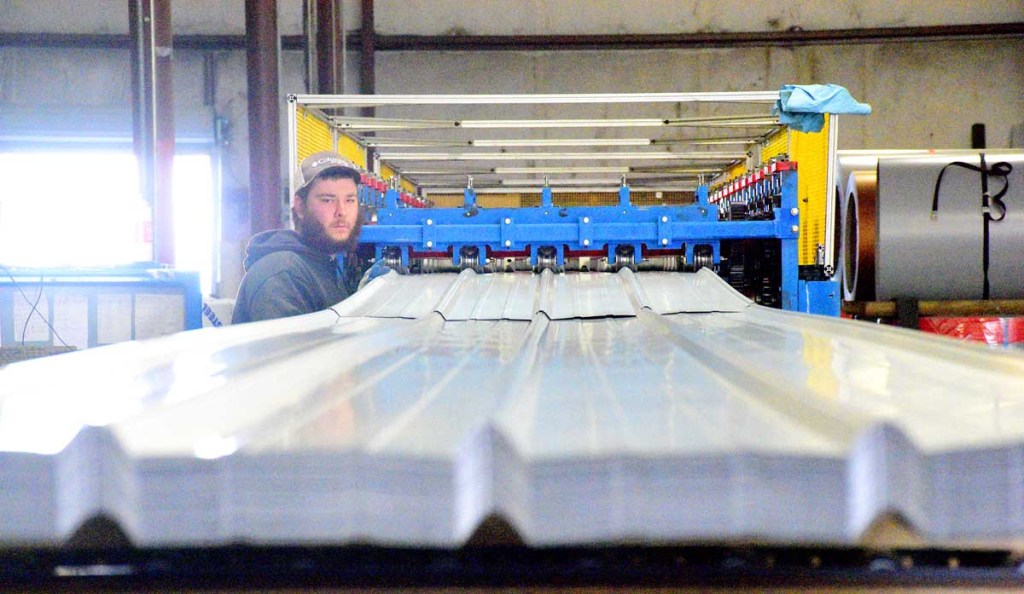Tariffs impacting local business
Published 5:45 am Saturday, April 7, 2018

- Roll former operator Joseph Wright is seen at AGCOR Steel April 5.
The far-reaching global market is spinning into treacherous waters as the United States and China wade into a trade war.
President Donald Trump fired the first salvo when he declared tariffs on imported aluminum and steel, a move that is already impacting Cullman.
AGCOR Steel, a manufacturer of metal building components in Cullman County since 2014, watched the tariff land at an inopportune moment.
“Right when the hailstorm hit the area, the tariff went in,” said AGCOR President Zac Smith. “A lot of the steel we buy is imported and we had an order that we went ahead and accepted at that time. That was 25 percent extra in cost and domestic is going up because of supply.”
The result for AGCOR is that its regular customers have been placed on allocation, meaning orders can’t be increased for special projects or needs. Smith said AGCOR also can’t take on new customers at this time.
“I’m fine with it, the tariff, but it hit at a bad time,” Smith said. “I think longterm in a free market it could help, but 25 percent overnight is too much.”
Smith explained that dependence on imported steel is not always about price. In AGCOR’s case, overseas suppliers the company buys from provide a higher quality of steel for the products it manufactures.
“The mills overseas invested more in technology and improved what they offer so that you can do the kind of product we provide,” Smith said. “There are about three mills domestically we buy from, and they do a good job.”
If demand remains high for steel and aluminum, Smith said it could eventually have a positive effect on domestic mills by pushing them to re-invest and provide higher quality products for American businesses.
“The biggest thing is the quality issue,” Smith said. “It’s getting to be a crunch right now and we’ve had to explain to customers why the prices are up. But we’re hoping this will work itself out and becomes positive.”
Tariffs and threats of tariffs have sent stock markets into a roller coaster of anxiety, culminating Friday in a loss of 572 points in the the Dow Jones industrial average.
Caterpillar dropped 3.5 percent, the most in the Dow. Caterpillar and other industrial companies rely heavily on overseas sales and could suffer if commerce is curtailed by rising trade barriers. The latest market swing came after President Donald Trump proposed tariffs on an additional $100 billion in Chinese goods, the Associated Press reported.
While steel and aluminum tariffs are causing plenty of headaches, there is also a great deal of anxiety in the agricultural community as China threatens to retaliate with its own tariffs on American pork, fruit, nuts, soybeans and other exported products that have provided farmers with lucrative markets.
For the time being, Alabama farm exports don’t appear to be jeopardy, but farmers are watching closely, said John McMillan, commissioner of Alabama Agriculture & Industries.
“Right now, it’s a moving target,” McMillan said. “But we’ve seen the Chinese name beef, whiskey, wine, soybeans, oranges, apples, nuts and some other products. Poultry is not affected because China does not import American poultry after the avian influenza outbreak. A lot of the poultry from Alabama ships to Cuba where it’s in high demand.”
Alabama farmers, however, produce soybeans and beef and lower levels of fruit and other products. McMillan said beef and soybeans could be affected, but noted that most of the soybeans grown in Alabama are crushed for oil. He said the oil is not a highly exported item from the state.
“We have 7,000 to 10,000 tons per month of poultry shipping just out of Mobile and it’s a huge business for Alabama. The higher producers of pork like North Carolina and in the Midwest are really concerned. And California’s wine industry is nervous. That’s a large export to China among other products that come from California,” McMillan said.
The uncertainty of the tariffs is causing farmers to consider carefully what they will plant in Alabama and elsewhere, McMillan added.
“Soybean is planted later than corn, so I know there is speculation about what to do,” McMillan said. “There’s uncertainty and we don’t know how long this will last. Agriculture is a global business now and has been huge in Alabama. It’s important that we can export our products, so everyone is keeping up with this situation.”





